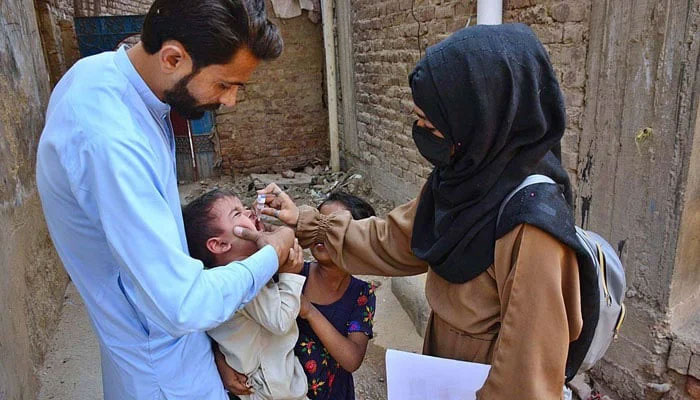Another child crippled by polio
The latest victim, a 35-month-old boy from Quetta, had not received any routine immunization doses
ISLAMABAD: Another child has been paralysed by polio in Balochistan, marking the 33rd case of the disease in Pakistan this year, Polio Eradication officials said on Monday.
The latest victim, a 35-month-old boy from Quetta, had not received any routine immunization doses. According to his parents, he received supplementary immunization activity (SIA) doses inconsistently.
The child experienced the onset of paralysis on August 22, 2024, despite ongoing vaccination efforts aimed at curbing the wild poliovirus, which continues to circulate, particularly in Balochistan. Of the 33 cases reported across Pakistan this year, 17 have emerged from Balochistan, highlighting the province as the most affected region.
Officials from the Polio Eradication Initiative (PEI) said that environmental samples from Quetta district and Quetta block have consistently tested positive for WPV1 this year, indicating continued circulation of the virus and heightened risk to children. In 2024 alone, 37 positive environmental samples and three cases have been reported from Quetta, while Quetta block has reported 65 positive samples and 11 cases.
A widespread refusal to vaccinate by parents, driven by misinformation and mistrust, is a major factor behind the polio resurgence. PEI officials noted that an increasing number of children in Pakistan have never received any vaccine, a dangerous trend that continues to fuel the transmission of the virus. In Quetta, where environmental samples repeatedly test positive for the virus, children are especially vulnerable.
Compounding the issue are the logistical difficulties posed by local protests and insecurity, which have led to disruptions in vaccination campaigns. Health experts warn that the rise of “zero-dose” children, coupled with harmful myths about vaccines causing sterility, threatens not just the fight against polio but also efforts to control other vaccine-preventable diseases like diphtheria, measles, and pertussis.
Pakistan’s struggle to eliminate polio reflects broader healthcare challenges, particularly in reaching remote and underserved populations. The resurgence of vaccine-preventable diseases like polio underscores the need for intensified efforts to combat vaccine hesitancy and ensure all children are fully immunized.
This latest case serves as a reminder of the urgent need for action to tackle misinformation, overcome logistical barriers, and rebuild trust in vaccinations, PEI officials added.
-
 Extreme Cold Warning Issued As Blizzard Hits Southern Ontario Including Toronto
Extreme Cold Warning Issued As Blizzard Hits Southern Ontario Including Toronto -
 Lana Del Rey Announces New Single Co-written With Husband Jeremy Dufrene
Lana Del Rey Announces New Single Co-written With Husband Jeremy Dufrene -
 Ukraine-Russia Talks Heat Up As Zelenskyy Warns Of US Pressure Before Elections
Ukraine-Russia Talks Heat Up As Zelenskyy Warns Of US Pressure Before Elections -
 Lil Nas X Spotted Buying Used Refrigerator After Backlash Over Nude Public Meltdown
Lil Nas X Spotted Buying Used Refrigerator After Backlash Over Nude Public Meltdown -
 Caleb McLaughlin Shares His Resume For This Major Role
Caleb McLaughlin Shares His Resume For This Major Role -
 King Charles Carries With ‘dignity’ As Andrew Lets Down
King Charles Carries With ‘dignity’ As Andrew Lets Down -
 Brooklyn Beckham Covers Up More Tattoos Linked To His Family Amid Rift
Brooklyn Beckham Covers Up More Tattoos Linked To His Family Amid Rift -
 Shamed Andrew Agreed To ‘go Quietly’ If King Protects Daughters
Shamed Andrew Agreed To ‘go Quietly’ If King Protects Daughters -
 Candace Cameron Bure Says She’s Supporting Lori Loughlin After Separation From Mossimo Giannulli
Candace Cameron Bure Says She’s Supporting Lori Loughlin After Separation From Mossimo Giannulli -
 Princess Beatrice, Eugenie Are ‘not Innocent’ In Epstein Drama
Princess Beatrice, Eugenie Are ‘not Innocent’ In Epstein Drama -
 Reese Witherspoon Goes 'boss' Mode On 'Legally Blonde' Prequel
Reese Witherspoon Goes 'boss' Mode On 'Legally Blonde' Prequel -
 Chris Hemsworth And Elsa Pataky Open Up About Raising Their Three Children In Australia
Chris Hemsworth And Elsa Pataky Open Up About Raising Their Three Children In Australia -
 Record Set Straight On King Charles’ Reason For Financially Supporting Andrew And Not Harry
Record Set Straight On King Charles’ Reason For Financially Supporting Andrew And Not Harry -
 Michael Douglas Breaks Silence On Jack Nicholson's Constant Teasing
Michael Douglas Breaks Silence On Jack Nicholson's Constant Teasing -
 How Prince Edward Was ‘bullied’ By Brother Andrew Mountbatten Windsor
How Prince Edward Was ‘bullied’ By Brother Andrew Mountbatten Windsor -
 'Kryptonite' Singer Brad Arnold Loses Battle With Cancer
'Kryptonite' Singer Brad Arnold Loses Battle With Cancer




